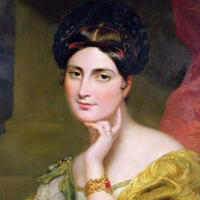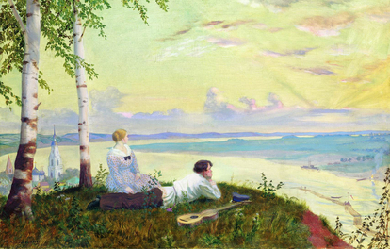The Faithful Guardian
Two beautiful and rosy babes are pictured here alone,
Two infants of a noble race, as any near the throne:—
And, in the cradle’s shadow, lies a stately-looking hound,
His fine limbs full of strength and grace, couched humbly on the ground:
Humbly upon the ground lies he: while from the young child’s arm
A jealous spaniel snarling peeps, whom no caress can charm;
Though close that dimpled arm is bent, as though its clasp would fain
Its spoiled companion’s idle wrath to gentleness restrain;
Small need of care! The stately hound, still calm and couchant lies,
With lazy kindness lifting up his wise and honest eyes;
Declaring by the emblem meet of his serene repose,
How frankly generous hearts can bear the baiting of mean foes.
Not so, 0! noble-natured brute, would’st thou quiescent rest,
If the soumd of danger roused the blood within thy valiant breast;
If near these helpless little fays,—thy master’s children—came
The doubtful tread of stranger’s feet, on whom they had no claim;
Then, then, upspringing with a bound;—aroused for their defence,—
Each nerve would arm with savage strength thy keen and eager sense,
And the darkly gleaming eyes where now such softened shadows play,
Would burn like watch-fires, lit at night, to scare the foe away.
And were the danger real to these, by whom thy watch is kept,—
E’er a rough hand should dare profane the cradle where they slept,
E’er a rude step should reach the spot where now they smile at play,—
Thy fangs would meet within his throat, to hold the wretch at bay!
Thou would’st battle, noble creature, for these children of thy lord’s,
As men fight for a Royal Prince, whose crown hangs on their swords;—
Soldiers, who hear their General’s cry, by treachery hemm’d in,—
Freemen, who strike for home and hearth, 'gainst Tyranny’s proud sin,—
So would’st thou strive! And bold were he who then could lay thee low,
For still thy fierce and mighty grasp would pin the struggling foe,
And if keen sword, or human skill, cut short thy gasping breath,
Should he be thought thy conqueror? No!—Thy conqueror would be Death.
Oh, tried and trusted! Thou whose love ne’er changes nor forsakes,
Thou proof how perfect God hath stamped the meanest thing he makes;
Thou, whom no snare entraps to serve, no art is used to tame,—
(Train’d, like ourselves, thy path to know, by words of love and blame
Friend! who beside the cottage door, or in the rich man’s hall,
With steadfast faith still answerest the one familiar call,—
Well by poor hearth and lordly home thy couchant form may rest,
And Prince and Peasant trust thee still, to guard what they love best!



